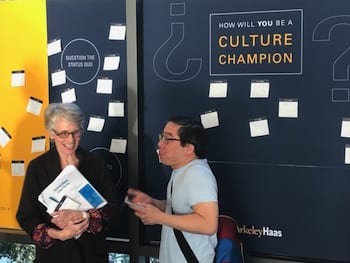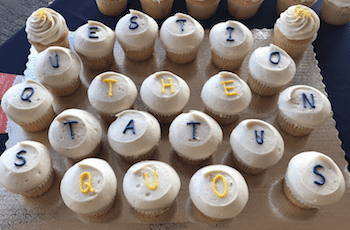It’s the 8th birthday of the Berkeley Haas Defining Leadership Principles: Question the Status Quo, Confidence Without Attitude, Students Always and Beyond Yourself, four succinct phrases that have come to be widely associated with the school and Dean Rich Lyons.
“Leaders set culture,” Lyons said last week at Haas Culture Day, a community celebration of the Defining Leadership Principles (DLPs). “This is an important part of what leaders do. You can’t think about leadership without thinking about setting norms and values.”
That leadership has paid off. A recent Poets & Quants article described Haas as “the archetype for a values-driven MBA program.”
Seventy-five percent of students from all three MBA programs and the undergraduate program cite the DLPs as a strong reason for choosing Haas, while more than 90 percent of alumni surveyed from the past decade said they were familiar with the principles and use them when navigating both their careers and their personal lives.
In this video, we asked members of the Haas community: What’s your favorite Defining Leadership Principle?
To sustain and expand the school’s culture efforts under the current and future deans, the school has launched the new Haas Culture and Leadership Fund. Money from the fund will be applied to, among other things, strengthening the culture content in the curriculum, providing financial aid and awards to students who exemplify the DLPs, giving research support to faculty who exemplify the DLPs, and supporting the existing institutes and centers that represent the culture and Defining Leadership Principles.

As he prepares to complete his tenure June 30 and return to his faculty role, we asked Lyons to take a moment to reflect on what has changed since he launched the culture initiative. Lyons recently co-wrote a case with Prof. Jennifer Chatman tracking the history of the DLPs and how the culture was codified at Haas. A second case is forthcoming
You’ve said the principles did not come out of nowhere, but rather codified a culture that has been here for many years. Does this make you more hopeful that we will be able to hold on to them after you complete your tenure as dean?
Yes, it definitely does. Nobody was surprised by those principles. And only very rarely—and rather inconsistently—has anyone suggested that we missed one that is as fundamental as the four we harmonized around.
How has the environment at Haas changed since we launched the Defining Leadership Principles eight years ago?
I’d say that we are seeing stronger data every year that the DLPs are affecting what we really care about. For example, we have clear data on how the Defining Leadership Principles are helping us win yield battles (i.e., when students choose Haas over other schools they’ve been admitted to). The DLPs are also motivating our donors. Alumni awareness of the principles is way up, and their engagement based on them is way up. We are also bringing in more executive education clients who tell us that they chose us because of the clear culture fit.

Can you give a few examples of how alumni, staff, and students are living the principles in their lives and workplaces?
One alum told us that the DLPs have been important for him in thinking about the best way to raise his children. Another named a new company CWA for Confidence Without Attitude. Alums in great numbers nominate other alums as exemplars of one or more of the principles—in fact, the act of nominating is itself quite “beyond yourself.” Staff are increasingly leaning into the professional development opportunities we are providing, an indicator of Students Always. And many tell their colleagues, and potential staff recruits, that they came here because of the DLPs—and that they see them in the people around them. The students are taking notes on readings and sending those notes to their classmates—again an example of Beyond Yourself. They are designing ways to have deeper, more difficult conversations about race and gender and hot political topics (Question the Status Quo). They are using the DLPs to motivate importance advances in the student community, e.g., the ally movement.
Which principle is resonating most with you now?
It has always been hard for me to look at them as anything but a “system” taken all together. The one principle that still seems like it sets us apart the most externally versus our top competition is Confidence Without Attitude. But for me personally, the one resonating the most right now is Beyond Yourself. There’s so much in that one that it’s inexhaustible.